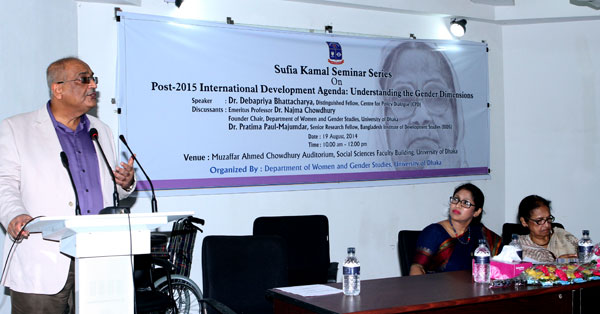while addressing a seminar on “Post-2015 International Development Agenda: Understanding the Gender Dimensions” organised by Women and Gender Studies Department of Dhaka University, at Mozaffar Ahmed Chowdhury Auditorium, Faculty of Social Science on Tuesday, 19 August 2014.
View more news reports on the event here.
Published in The Daily Star
UN Agenda for Women’s Equal Rights to Inheritance
Proposed UN agenda leaves onus on nat’l laws
Observes Debapriya Bhattacharya, explaining gender dimensions of post-2015 dev goals
Staff Correspondent
The issue of women’s equal rights to inheritance has come up in the UN’s post-2015 development agenda, but nothing could be done if the national laws do not empower women to inherit property, eminent economist Debapriya Bhattacharya said yesterday.
He made the observations shining light on a proposed goal in the plan, which asks countries to “undertake reforms to give women equal rights to…inheritance” but “in accordance with national laws”.
Many of the 193 countries have discriminatory laws, so questions remain about implementation of the goal, he said, while explaining the gender dimensions of the Sustainable Development Goals (SDGs) that would follow the Millennium Development Goals (MDGs) after 2015.
As chair of the Southern Voice on Post-MDG International Development Goals, Bhattacharya made a presentation on women’s issues in SDGs at a seminar yesterday, organised by the Department of Women and Gender Studies at Dhaka University.
Among the proposed 17 goals and 169 targets in SDGs, Goal 5a specifies, “Undertake reforms to give women equal rights to economic resources, as well as access to ownership and control over land and other forms of property, financial services, inheritance, and natural resources in accordance with national laws.”
Comparing the gender specific goals of MDGs and SDGs, Debapriya said the former only focused on education. “But, education alone could not empower women and ensure their economic participation,” he said.
A similar concern was raised about political participation of women.
Debapriya asked the participating students whether they think that the proportion of seats held by women in the national parliament of LDCs, which has increased from 12.7 to 20 between 1990 and 2012, has actually benefited women’s development.
“It is no use putting someone in power without changing the current socio-political structure,” he said, agreeing with the students who observed that increasing reserved seats for women could make little changes in society, which largely remains patriarchal. Professor Emeritus Najma Chowdhury, founder of the department, Prof Tania Haque, head of the department, and Pratima Paul Majumdar, senior research fellow at the Bangladesh Institute of Development Studies (BIDS), participated in the discussion.
Published in Prothom Alo
সংসদে প্রতিনিধিত্ব বাড়লেই নারীর ক্ষমতায়ন হয় না
নিজস্ব প্রতিবেদক
জাতীয় সংসদে নারীর অংশগ্রহণ বাড়লেই নারীর ক্ষমতায়ন এবং নারীর উন্নয়ন ঘটে বলে আগে যে ধারণা চালু ছিল, তা নিয়ে বর্তমানে বিশ্বজুড়েই সংশয় দেখা দিয়েছে বলে মন্তব্য করেছেন সেন্টার ফর পলিসি ডায়ালগের ফেলো দেবপ্রিয় ভট্টাচার্য।
অর্থনৈতিক সম্পত্তিতে নারীর সমানাধিকার, তথ্যপ্রযুক্তিতে নারীর ক্ষমতায়ন এবং প্রয়োজনীয় আইন না থাকলে সেই অর্থে নারীর উন্নয়ন সম্ভব নয় উল্লেখ করে অর্থনীতিবিদ দেবপ্রিয় ভট্টাচার্য বলেন, জাতিসংঘের সহস্রাব্দ উন্নয়ন লক্ষ্যমাত্রা (এমডিজি) অর্জনের বিভিন্ন ক্ষেত্রে বাংলাদেশের অবস্থান ভালো। সামাজিক বিভিন্ন সূচকে নারীরা এগিয়েছে। তবে অর্থনৈতিক ক্ষেত্রে জেন্ডার সাম্য অর্জনে বাংলাদেশের অবস্থান সন্তোষজনক নয়।
দেবপ্রিয় ভট্টাচার্য বলেন, রাজনৈতিক ক্ষমতায়নের মতোই সামাজিক সূচকে নারীর অবস্থান ভালো হলেই নারীর অর্থনৈতিক ক্ষমতায়ন আসলে কতটুকু হবে, তা নিয়েও প্রশ্ন দেখা দিয়েছে। গতকাল মঙ্গলবার ঢাকা বিশ্ববিদ্যালয়ের উইমেন অ্যান্ড জেন্ডার স্টাডিজ বিভাগের অংশ হিসেবে আয়োজিত সেমিনারের মূল বক্তা হিসেবে তিনি এসব কথা বলেন।
ঢাকা বিশ্ববিদ্যালয়ের সামাজিক বিজ্ঞান অনুষদের মিলনায়তনে অনুষ্ঠিত সেমিনারে ‘পোস্ট-২০১৫ ইন্টারন্যাশনাল ডেভেলপমেন্ট এজেন্ডা: আন্ডারস্ট্যান্ডিং দ্য জেন্ডার ডাইমেনশন’ শীর্ষক বক্তৃতায় সাউদার্ন ভয়েস অন পোস্ট-এমডিজি ইন্টারন্যাশনাল ডেভেলপমেন্ট গোলসের চেয়ার দেবপ্রিয় ভট্টাচার্য ২০১৫ সালের পর টেকসই উন্নয়ন লক্ষ্যমাত্রা-সাসটেইনেবল ডেভেলপমেন্ট গোলস-এসডিজি নির্ধারণে জেন্ডারের বিষয়টি নিয়ে বিশ্বব্যাপী কোন ধরনের বিতর্ক হচ্ছে, সেসব তুলে ধরেন। এমডিজিতে জেন্ডার সাম্য অর্জনে বিশ্ব, দক্ষিণ এশিয়া এবং বাংলাদেশের বিভিন্ন সূচকও তিনি তুলে ধরেন।
দেবপ্রিয় আরও বলেন, জাতিসংঘে আলোচনায় এমডিজি-পরবর্তী বা এসডিজিতে নারীর প্রজননস্বাস্থ্য অধিকার এবং নারী নির্যাতনের বিষয়টি সম্পৃক্ত করা হয়েছে। তবে এ দুটি বিষয়ে এখনো বিতর্ক চলছে। প্রজননস্বাস্থ্য অধিকারের বিষয়টিতে অনেক দেশ আপত্তি দিচ্ছে। আবার নারী নির্যাতনের সংজ্ঞা কী হবে, পারিবারিক, রাষ্ট্রীয় বা কোন পর্যায়ের নির্যাতনকে গুরুত্ব দেওয়া হবে, তা নিয়ে আলোচনা চলছে।
সেমিনারের প্রশ্নোত্তর পর্বে দেবপ্রিয় ভট্টাচার্য জাতীয় সংসদে নারীর অংশগ্রহণ বাড়ানো প্রসঙ্গে বলেন, কাঠামো পরিবর্তন না করে কাউকে কোনো জায়গায় বসিয়ে দিলেও সে অর্থে উন্নয়ন সম্ভব নয়। কেননা যে বসছে, সে সেই কাঠামোর মধ্যে থেকেই কাজ করছে।
সেমিনারে সঞ্চালকের দায়িত্ব পালন করেন উইমেন অ্যান্ড জেন্ডার স্টাডিজ বিভাগের চেয়ারম্যান তানিয়া হক। আলোচনায় বাংলাদেশ ইনস্টিটিউট অব ডেভেলপমেন্ট স্টাডিজের (বিআইডিএস) সাবেক জ্যেষ্ঠ রিসার্চ ফেলো প্রতিমা পাল মজুমদার বলেন, বাংলাদেশে এমডিজিতে জেন্ডারের ক্ষেত্রে যেসব লক্ষ্যমাত্রা নির্ধারণ করা হয়েছিল, তার অনেক ক্ষেত্রেই বাংলাদেশের অর্জন ভালো। তবে এ অর্জন সংখ্যাগত, গুণগত নয়।
Published in Samakal
সামাজিকভাবে সঠিক মূল্যায়ন পান না নারীরা: ড. দেবপ্রিয়
বিশ্ববিদ্যালয় প্রতিবেদক
‘নারীর অধিকার প্রতিষ্ঠায় প্রয়োজন রাজনৈতিক ও প্রশাসনিক ক্ষেত্রে তাদের সমান অংশগ্রহণের অধিকার দেওয়া। তাহলে তারাও দেশের উন্নয়নে সমান অবদান রাখতে পারবেন। বর্তমানে নারীরা দেশে সব ক্ষেত্রে কাজ করলেও তারা সামাজিকভাবে সঠিক মূল্যায়ন পান না। গতকাল মঙ্গলবার বিকেলে ঢাকা বিশ্ববিদ্যালয়ের সামাজিক বিজ্ঞান অনুষদ ভবনের মোজাফফর আহমেদ চৌধুরী মিলনায়তনে ‘ইন্টারন্যাশনাল ডেভেলপমেন্ট এজেন্ডা : আন্ডারস্ট্যান্ডিং দ্য জেন্ডার ডাইমেনশন্স’ শীর্ষক সেমিনারে সিপিডির সম্মানিত ফেলো ড. দেবপ্রিয় ভট্টাচার্য এসব কথা বলেন।
বিশ্ববিদ্যালয়ের উইমেন অ্যান্ড জেন্ডার স্টাডিজ বিভাগ সুফিয়া কামাল সেমিনার সিরিজের অংশ হিসেবে আয়োজিত ওই সেমিনারের প্রধান বক্তা ছিলেন ড. দেবপ্রিয়।
উইমেন অ্যান্ড জেন্ডার স্টাডিজ বিভাগের চেয়ারপারসন তানিয়া হকের সভাপতিত্বে আলোচনা সভায় বক্তব্য রাখেন বিভাগের প্রতিষ্ঠাতা চেয়ারপারসন ও ইমেরিটাস অধ্যাপক ড. নাজমা চৌধুরী এবং বাংলাদেশ উন্নয়ন অধ্যয়ন ইনস্টিটিউটের (বিআইডিএস) সিনিয়র রিসার্চ ফেলো ড. প্রতিমা পাল মজুমদার প্রমুখ।
দেবপ্রিয় ভট্টাচার্য আরও বলেন, এবার এইচএসসির ফলে নারীরা সংখ্যার দিক থেকে এগিয়ে থাকলেও তাদের গুণগত মান বৃদ্ধি পায়নি। বিজ্ঞান শিক্ষায় নারীরা আজও অনেক বেশি পিছিয়ে আছে।
অধ্যাপক নাজমা চৌধুরী বলেন, মেয়েদের সামাজিকভাবে ক্ষমতায়ন বৃদ্ধি পেয়েছে; কিন্তু তারা অর্থনৈতিকভাবে ও জ্ঞানগত দিক থেকে অনেক বেশি পিছিয়ে আছে।
প্রতিমা পাল মজুমদার বলেন, বাংলাদেশে নারী শিক্ষার হার বৃদ্ধি পেয়েছে; কিন্তু আর্থিক ও সামাজিক দিক থেকে নারীরা এখন অনেক পিছিয়ে রয়েছে।



